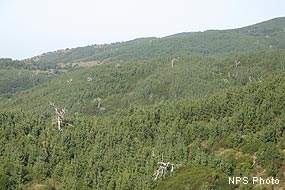
Fire is one of the most important processes in shaping the ecosystems of the western United States. Fire recycles nutrients and increases diversity across the landscape. A wide variety of plants depend on fire to regenerate. Many animals, in turn, benefit from increased plant growth following fire. Fire ecology is the study of fire as an ecosystem process. Fire affects and is affected by many aspects of the ecosystem including soil, water, air, vegetation and wildlife. Fires can be studied as individual events or as repeated processes across the landscape. Fire regimes describe patterns of fire across a landscape. Important aspects of fire regimes include how frequently fires occur, how intense fires are, how large fires are and the season during which fires generally occur. It is important to recognize that fire regimes are variable across space and time. Pyrodiversity, which is the term for this variability in fire regimes, promotes biodiversity. Within Point Reyes National Seashore there are many different vegetation types, each adapted to a different fire regime. Learn More |
Last updated: February 16, 2024
